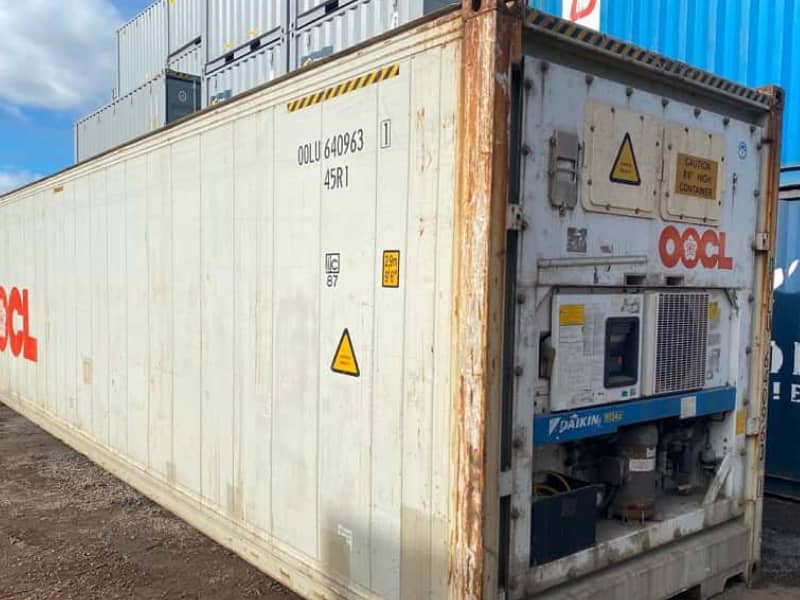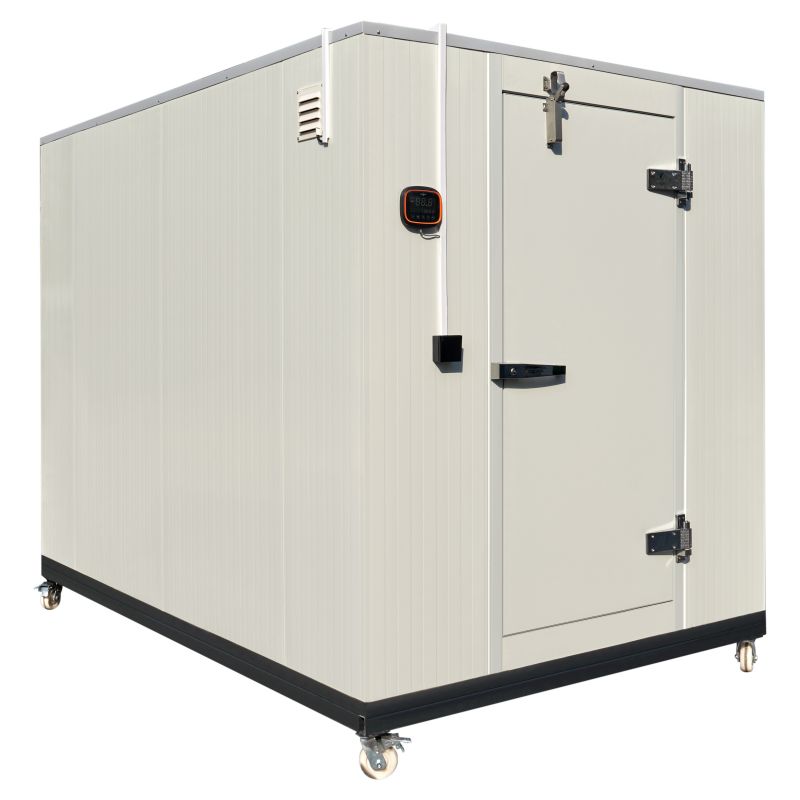All Regarding Freezer Containers: Vital Insights for Your Storage Space Needs
Cold store containers play a crucial duty in the preservation of disposable products. They are available in different types, consisting of chilled and insulated devices, each designed for specific storage space requirements. Understanding the advantages and vital attributes of these containers is necessary for businesses aiming to optimize their procedures. As the need for effective storage services grows, exploring the various alternatives available can lead to notified decisions that impact both profitability and sustainability. What variables should one consider when picking the best container?
Kinds Of Freezer Containers
Freezer containers come in different types, each created to satisfy specific temperature control requirements. Amongst the most common types are chilled containers, which maintain temperatures between 0 ° C to 10 ° C, making them appropriate for disposable products like fruits, vegetables, and dairy products. One more type is the deep freezer container, which operates at temperatures below -18 ° C, ideal for long-lasting storage of icy products such as meats and fish and shellfish.
Protected containers provide temperature stability without energetic cooling, making them valuable for short-term transportation of temperature-sensitive items. In addition, there are portable chilly storage units, which provide versatility in places and are often utilized in occasions or seasonal procedures. Blast chillers rapidly decrease the temperature of warm foods, making sure safety and security and top quality. Each kind serves an unique objective in different industries, from food solution to drugs, highlighting the significance of choosing the appropriate container for certain storage requirements.

Advantages of Utilizing Cold Store Solutions

Cold storage solutions expand the shelf life of things, lowering waste and increasing earnings for companies. By successfully managing supply with proper temperature control, companies can maximize their supply chains and improve operational effectiveness.
Additionally, freezer centers allow for adaptable storage space alternatives, accommodating various quantity needs and seasonal changes popular (used 40ft refrigerated shipping containers). This adaptability assists services respond swiftly to market changes
Finally, using chilly storage space services can ensure conformity with health and wellness policies, guarding both consumers and companies. Overall, the tactical use of chilly storage improves item monitoring while advertising sustainability and financial stability.
Trick Features to Look for in Cold Store Containers
When choosing freezer containers, a number of crucial attributes value careful consideration to safeguard peak efficiency and integrity. Initially, temperature level control capabilities are important; containers ought to preserve consistent temperature levels ideal for details items. Insulation quality also plays a significant function, as exceptional insulation minimizes energy intake and boosts temperature stability.
Next off, convenience of gain access to and loading is critical; containers need to supply straightforward styles for efficient handling and organization. Sturdiness is one more essential aspect; weather-resistant products guarantee longevity and protect contents against environmental variables.
Additionally, mobility attributes, such as built-in wheels or raising factors, help with transport, while personalized designs enable customized storage options.
Keeping an eye on systems, including temperature level alarm systems and remote tracking, provide real-time updates, making certain that conditions remain optimal. By concentrating on these attributes, customers can select freezer containers that fulfill their operational demands effectively.
Choosing the Right Freezer Container for Your Requirements
Choosing the appropriate cool storage space container requires a thoughtful evaluation of operational needs and details demands. Elements such as the type of items being saved, temperature level sensitivity, and volume should be focused on. For instance, disposable food products might demand containers with strict temperature level controls, while drugs might require precise conditions to maintain effectiveness.
Additionally, potential users should take into consideration the container's dimension and mobility. A bigger unit may be needed for mass storage space, while smaller, mobile options might be excellent for momentary or on-site needs. Insulation high quality and power effectiveness are also critical, as these will certainly impact functional costs and temperature level stability.
Compliance with industry guidelines and standards is crucial, specifically in industries like food and healthcare. By very carefully examining these aspects, individuals can select a cold storage container that properly meets their one-of-a-kind demands and assurances ideal storage space problems.
Ideal Practices for Keeping Cold Storage Space Conditions
Maintaining suitable freezer conditions is essential for protecting the quality and security of temperature-sensitive products. Regularly monitoring temperature and humidity degrees is crucial; using reputable electronic thermometers and hygrometers can give accurate analyses. Additionally, correct insulation of get redirected here cold store containers helps lessen temperature changes and power loss.
Implementing a first-in, first-out (FIFO) system assures that older stock is used prior to more recent stock, lowering waste (used 40ft refrigerated shipping containers). Furthermore, preserving an arranged format within the storage space enables for far better airflow and lessens the risk of cross-contamination
Regular maintenance examine equipment, such as seals and compressors, are very important to avoid breakdowns. Team training on best techniques for filling and discharging products assists keep temperature integrity. Keeping doors shut as much as feasible restrictions heat exchange, ensuring that the cool storage space atmosphere continues to be secure and reliable in preserving valuable items.
Price Factors To Consider for Cold Store Solutions
When examining freezer services, it is vital to take into consideration the preliminary financial investment expenses together with continuous functional expenditures. A thorough breakdown of these prices can reveal considerable long-term savings possibility for businesses. Recognizing these financial elements aids stakeholders make informed decisions regarding their cool storage demands.

Initial Investment Expenses
The economic landscape of cool storage containers presents numerous preliminary financial investment prices that businesses need to take into consideration. These expenses generally consist of the acquisition or rental rate of the containers, which can differ based upon type, size, go and insulation top quality. Furthermore, expenditures connected to retrofitting existing frameworks to accommodate freezer needs to be factored in, especially if specialized equipment is called for. Installment costs, consisting of electrical work and refrigeration systems, likewise contribute to the general initial financial investment. Organizations must not overlook transport costs for supplying containers to their desired area. Possible modification choices, such as shelving or temperature level monitoring systems, can even more impact the preliminary economic outlay. Careful budgeting for these aspects is necessary for successful freezer execution.
Operational Costs Failure
Operational costs for cool storage options encompass a number of essential cost factors to consider that companies have to navigate. Key aspects include power costs, which can be significant because of the demand to preserve low temperatures. Upkeep costs are likewise substantial, as routine maintenance is important to ensure tools runs effectively and remains compliant with health and wellness standards. Furthermore, labor prices may arise from the requirement for specialized team to manage and keep track of the storage atmosphere. Insurance policy expenditures are an additional factor to consider, as companies should secure their investments against prospective losses. Any kind of possible governing compliance costs should be factored in, as organizations may need to invest in systems that stick to food security and environmental guidelines. Understanding these expenditures is vital for efficient budgeting.
Long-Term Cost Savings Potential
Purchasing cool storage services offers significant long-lasting financial savings possibility, transforming initial expenses into economic effectiveness in time. By minimizing perishing and waste, services can improve their profit margins substantially. Advanced insulation and energy-efficient systems lower energy costs, which accumulate over the life-span of the devices. Furthermore, cool storage containers typically need less frequent maintenance contrasted to traditional refrigeration methods, leading to lower repair work costs. The ability to shop products for prolonged durations without compromising top quality allows services to maximize market changes, maximizing profits. Furthermore, the scalability of freezer solutions makes it possible for business to adjust to changing demands without sustaining too much costs. Generally, these factors contribute to Discover More Here an engaging case for cold store as a cost-effective financial investment strategy.
Frequently Asked Questions
How Much Time Can Food Be Saved in Freezer Containers?
The period food can be saved in chilly storage space containers differs by kind. Usually, disposable products last from days to weeks, while frozen foods can stay risk-free for months, relying on correct temperature level and storage space problems.
Are Freezer Containers Energy-Efficient?
The energy effectiveness of freezer containers varies based on design and insulation quality. Modern units usually make use of innovative modern technology to decrease power usage, inevitably contributing to lowered functional expenses and environmental impact in long-term use.
Can Freezer Containers Be Customized for Details Demands?
Cold storage space containers can without a doubt be tailored to satisfy particular needs. Modifications might consist of temperature controls, dimension changes, and extra functions, allowing customers to customize services effectively for numerous storage space requirements and functional choices.
What Are the Common Sizes of Freezer Containers?
Cold storage containers normally are available in conventional sizes such as 10, 20, and 40 feet. These measurements fit various storage space demands, ensuring flexibility for services needing temperature-controlled environments for perishable goods or delicate materials.
Do Freezer Containers Require Special Permits for Use?
Cold store containers typically require unique permits for use, relying on regional laws and meant applications. Authorities might mandate permits to assure safety requirements, environmental compliance, and correct operational techniques are maintained throughout their utilization.
Cold storage space containers come in numerous types, each designed to satisfy specific temperature control demands. Additionally, cool storage space facilities permit for versatile storage space alternatives, accommodating different quantity needs and seasonal variations in demand. Picking the right chilly storage space container requires a thoughtful assessment of operational demands and particular demands. The economic landscape of cold storage containers provides different preliminary financial investment prices that companies should think about. Cold storage space containers can indeed be customized to meet particular requirements.